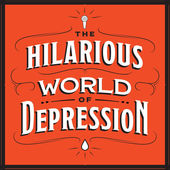Day 7: Comorbidity
ADHD rarely travels alone…
“Roughly half of all adults with ADHD have a comorbid condition. Like learning disorders, depression or anxiety.” Silver, Larry. “When It’s Not Just ADHD: Uncovering Comorbid Conditions.” ADDitude, ADDitude Magazine, April/May 2006, https://www.additudemag.com/when-its-not-just-adhd/.
There are so many things that are not well known when it comes to ADHD.
It’s my goal to share as much as I can to help you along your journey.
One thing that is often a surprise to my clients is that ADHD often does not travel alone.
More often than not, there are one or more conditions that it’s paired with.
What that means is, it can be tricky. Many adults that have ADHD that went undiagnosed most of their lives have struggled in another area. In fact, they may have even been treated for another thing instead of the ADHD.
Why?
Because the squeaky wheel gets the oil.
When multiple things are going on, the thing that screams out the loudest is often what we go to get help for.
It doesn’t mean that the secondary things are any less important, or that the impact of addressing them wouldn’t be life changing. We often just don’t know what we don’t know.
Once we do an initial consult and I have the opportunity to hear more about a person, I’m typically able to dig a little bit deeper and uncover a comorbid condition. (Let me be clear, I’m not a Dr. and if you are after a diagnosis that is definately who you should see.)
They’ll often say “oh, I’m dyslexic”, or “I’ve been treated for depression, but that was awhile ago”, “It sounds weird but I’m sensitive to background noises. I don’t like loud places, or the sound of chip bags crinkling during a movie (Misophonia).”
Or more commonly they won’t have a diagnosis, but when I describe “the thing”, they are like “wow, that is so me! I had no idea other people felt this way!” Which is always super fun because I remember for myself how helpful it was to have my first coach “normalize” my experience by sharing that it was common and nothing to be freaked out by.
So let’s define the fancy term. Comorbidity.
“the simultaneous presence of two chronic diseases or conditions in a patient.”
It sounds a lil scary to be honest.
Here’s what it looks like for me.
I’m emetophobic. Fyi, it’s about to get super real here. I know there are others like me (millions), and yet I also know that most of the population will have not one bit of understanding for what I’m about to talk about.
It’s ok. If you’re curious stay awhile. If not, catch me on the next post ;-)
Emetophobia is a phobia that causes overwhelming, intense anxiety pertaining to vomiting.
Yeah, I know, super weird.
I didn’t choose it, but somehow here we are.
To further elaborate on what it is…
This specific phobia can also include subcategories of what causes the anxiety, including a fear of vomiting in public, a fear of seeing vomit, a fear of watching the action of vomiting or fear of being nauseated.
For real for real, I have not been sick (ie vomited) since I was like 9 years old. Even when I feel awful and probably should, I won’t. Because you know, it seems like it could kill a person.
I have all of these ways to navigate it. (for those of you who are fellow emetophobes I promise a different post with details)
Here’s what I can say about it. It affected my daily life.
I used to be afraid to travel, go to amusement parks, eat sushi, drink too much, go to parties where other people would drink too much, get pregnant (hello morning sickness!). All of those things felt scary.
Why? Because they could all make you sick. Or put you in close proximity to someone who could be sick.
I never even considered ADHD. Are you kidding me?! I could barely manage the panic attacks around vomit.
Anyways, for the longest time I didn’t say a word to anyone but my close family. They all called it “my reaction” from the age of 9. It was really panic attacks that I was having. I didn’t realize that until much later.
What I hope this post does is share that it’s ok. You’re not weird. Everybody has something that they deal with. There’s freedom in sharing. Freedom in knowing that you can just be you and what others think is none of your business.
When I finally lifted my head up from anxiety and panic attacks I saw ADHD.
My son gave me a gift. Because I had him, and wanted to help him, I was also able to help myself.
Through researching why he struggled in school, I inadvertently realized I was wired much like him.
A gift.
I may not have ever looked into it otherwise, and knowing what I do now I’m so much better equipped to manage this busy mind of mine.
If you strugge with ADHD tendencies, emetophobia or anything really, I’d love to connect. That first step is often the hardest, but can change the way you live.
~Shaun





